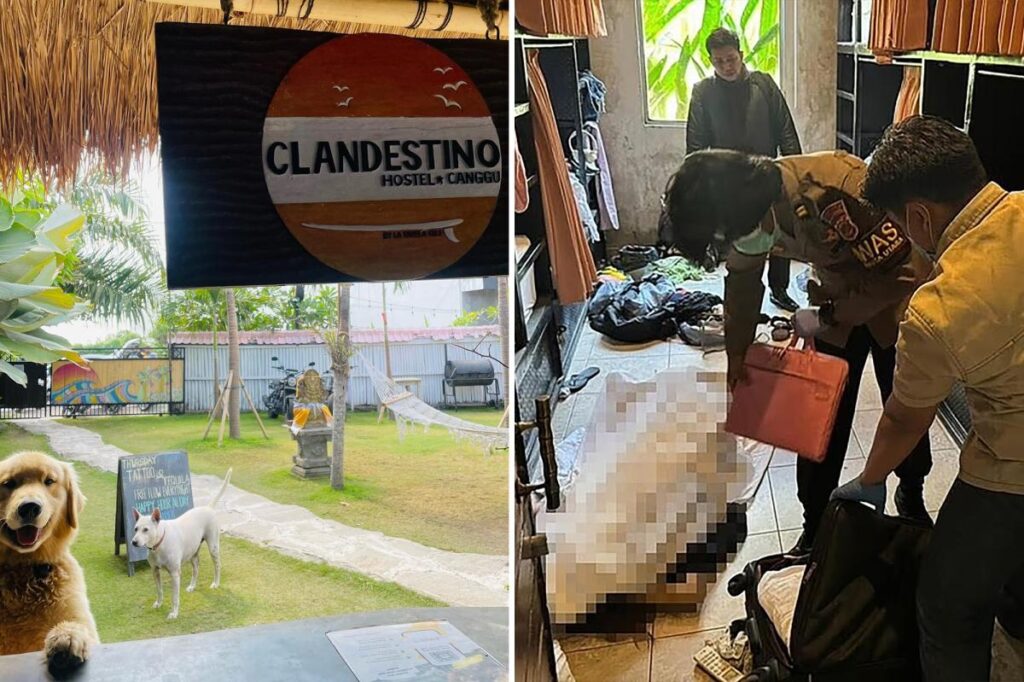The trip of a lifetime to the paradise island of Bali turned deadly for a 25-year-old Chinese tourist who died while staying at the Clandestino Hostel in Canggu following a suspected mass poisoning incident that has baffled experts.
Deqing Zhuoga and some 20 other guests fell ill with vomiting, diarrhoea, chills and shortness of breath while staying at the budget accommodation in September.
Around 10 travelers were rushed to intensive care, including Zhuoga’s friend, Leila Li, who fought for her life for five days.
Zhuoga was found without a pulse in her room on September 2, wearing only an unbuttoned blue shirt and surrounded by vomit.
Since her untimely death, there has been speculation that the group may have been poisoned by noxious fumes after the hostel was fumigated following a bed bug infestation. According to Li, she was diagnosed with pesticide poisoning and food poisoning while in hospital, and the room next to the one she and Zhuoga stayed in had been sealed off after being sprayed the day before.
Members of the group who became ill had reportedly also eaten a communal dinner the evening before Zhuoga was found dead in her room – further complicating theories about what may have occurred.
Experts told news.com.au that mass poisonings due to insecticides or pesticides were “medically possible” but extremely rare, and that the guests’ sudden illness after the communal dinner was also potentially significant.
“There are two possibilities that need to be examined here,” Dr. Dicky Budiman, a global health expert and epidemiologist, told news.com.au.
“Mass food poisoning after eating together, or the potential for a mass poisoning from insecticide or fumigation. Or it could be a combination of both.”
He added that insecticide poisoning made sense if the rooms at the hostel had been fumigated, but that the onset of symptoms soon after the dinner made food poisoning another possible culprit.
“If it was indeed because of insecticide, that could be possible if the fumigation was done incorrectly, such as in an area with guests or without adequate ventilation. Or if the insecticide contaminated food or food utensils.”
“There needs to be a thorough and comprehensive investigation into what happened.”
Dr. Ryki Sihombing, a doctor of internal medicine at Siloam Hospital in the Indonesian city of Medan, agreed that insecticide poisoning, food poisoning or a combination of both could be to blame, but added that, based on symptoms alone, it would be “very difficult” for a medical professional to make an assessment.
“If a patient was exposed to a high dose of insecticide due to fumigation for bed bugs, it is possible that they could experience toxicity, although I have never seen it happen,” he said.
“The treatment would be detoxification, and we would usually administer an antidote, although we would need to know the kind of toxin they were exposed to as there are different antidotes.”
He added that, if travelers suspected they had been poisoned by contaminated food, drinks, insecticide, or any other substance, they should try to bring a sample with them to the nearest hospital so that medical staff could test it and find an appropriate antidote.
Other experts also said they had never heard of anyone being poisoned due to bed bug fumigation, including Yusri, who runs Antira Pest Control in Medan.
“I have sprayed thousands of homes and no one has died,” he said.
However, while he could not comment on the case in Bali directly, Yusri said that some disreputable stores may sell budget or homemade insecticides rather than brand name products, and that these needed to be treated with caution.
“My business only uses Bayer insecticides from Germany. If you buy unbranded insecticides, you have no idea what the ingredients are. I also provide training for all my staff annually.”
He added that, while he thought it unlikely that anyone would die of insecticide poisoning at a hostel or hotel, it could perhaps be possible if those doing the fumigation used too much product, did not ventilate the area properly or used dangerous and unlicensed chemicals.
Yusri said that hotels needed to be cleared of staff and guests while fumigation was taking place and fully ventilated following the process for at least a few hours, if not longer. He added that all bedding needed to be washed in case of contamination.
“If you are in a hotel and you can smell insecticide or chemicals, it means that it is not safe to be there,” he said.
While the case in Bali has shocked travelers to the region, this is not the first time tourist deaths have been blamed on bed bug fumigation.
In February, British influencer, 24-year-old Ebony McIntosh and 26-year-old Nadine Raguse from Germany died in Colombo in Sri Lanka while staying at the Miracle Colombo City Hostel.
Their cause of death was suspected pesticide poisoning after the pair stayed in a room that had just been fumigated.
On November 12, a family of four died in mysterious circumstances while on holiday in Turkey.
The deaths of the Bocek family from Germany are currently under investigation, but it is suspected they may have been poisoned after rooms in their hotel were sprayed for bed bugs and the insecticide spread through a ventilation shaft.
“If tourists are staying in a hotel where fumigation is taking place and start to experience symptoms such vomiting, headaches or shortness of breath, they need to go straight to the emergency room at the nearest hospital,” Dr. Budiman warned.
He added it was important for tourists to tell medical personnel about any fumigation at their hotels.
“If you find that rooms have been sealed or smell strongly of chemicals, ask for clarification from management about the safety of the hotel, and check that it is properly ventilated to make sure that you are not at risk.”
“Do not sleep in a room that has just been fumigated.”
Read the full article here

